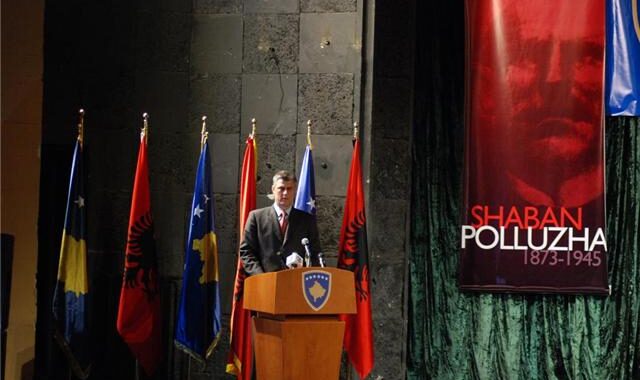Prishtina, 19 February 2009
The speech at the Memorial Ceremony, on the 64th anniversary of the death of Commander Shaban Polluzha and his naming as a Hero of Kosovo:
Ladies and gentlemen,
The end of the Second World War gave victory to the democratic forces of Europe, the victory of the anti-fascist coalition, opening a new chapter in international relations.
Albanians made a valued contribution to this war, which included the Balkans.
Unfortunately, the victory over fascism on a world scale was neither the end of oppression nor the advent of freedom for Kosovo’s Albanians. Despite the contribution they had made, Kosovo was not able to implement the Bujan Resolution.
The Serb-Yugoslav communist forces had constructed a strategy for the re-conquest of Kosovo in advance, building up motives and ideological cause to achieve the re-annexation of Kosovo within Serbia, i.e. Yugoslavia.
At the time when Kosovo would have tasted freedom, the Chetnik-Partisan forces began an even harsher campaign against Kosovo’s Albanians.
The people of Kosovo, who could not be tricked by an ideological mask and the empty slogans of the partisan and communist structures, understood and felt the full sinister implications of this Serbian strategy for re-conquering Kosovo.
The Serbian and Yugoslav communists’ plan was Kosovo’s subjugation through a program of terrorization. Using as a premise the historical trend of victory over fascism, Belgrade’s political and military leadership, camouflaged in communist ideology; began a campaign of killing, massacres and unprecedented oppression.
Halfway through December 1944, a man respected by the people, an old man of great vision and lifelong experience, both brave and of great strategic intelligence, Shaban Polluzha, decided to come to the defense of the people of Drenica.
All of Kosovo fought against the evils of Serbian Communism. Fighters from all over Kosovo took part in this heroic resistance.
Shaban Polluzha gained his military experience in the defense of threatened people in the battles against the Chetnik forces who had been attacking the undefended Albanian and Bosnian population of the Sanjak since 1941.
From a historical point of view, Shaban Polluzha showed himself to be a visionary; leading the people in battles for freedom, despite the fact that he was facing a power whose advance could not easily be stopped at that time.
The battle that Shaban Polluzha led was of historic significance. History proved the justice of what he did. He represents the first resistance to the brutal imposition of communism in Europe.
In the ranks of his Brigade, there were men who were absolutely committed to defending Kosovo against Serbian military maneuvers. They were not prepared to abandon Kosovo and leave it to the mercy of these tactics.
Shaban Polluzha decided to share the fate of his people. From January 24th, 1945 to February 22nd, 1945, the Shaban Polluzha Brigade carried on a tireless battle with the Serbian forces organized into a number of brigades.
The terror in Kosovo had begun months before the resistance of Shaban Polluzha’s brigade. Serious crimes and brutal killings were carried out against a people exhausted and impoverished by war and want. For years afterwards, the scars of that appalling civilian scene were etched into popular memory.
Together with his comrades in arms, and with unparalleled stoicism, Shaban Polluzha held out for an entire month. They demonstrated how deeply the people of Kosovo retained their moral values in defense of their land.
More than forty thousand troops were used in the battle against Shaban Polluzha’s Brigade. Despite being outnumbered, the fighters in his Brigade resisted day and night, making battlegrounds of the land in Drenica and nearby.
Even in the context of an unequal battle, the military organization of Shaban Polluzha’s Brigade showed military discipline, and the ethical code of a just, defensive war. This was shown in the humane treatment and unconditional release of prisoners taken after the conclusion of successful battles.
The policy of eliminating the most important elements of the nation was given clearly in the orders from the high military and political command in Belgrade. In the name of ideological battle, in the name of alleged collaboration with the occupiers, they created an opportunity for the destruction of all those who stood in the way of communist rule being extended across Kosovo.
On February 8th, 1945, Tito, the head of the partisans, placed Kosovo under military administration. This was a pretext to silence every voice which stood in the way of de facto and de jure annexation of Kosovo under Serbia’s administration.
The resistance of Shaban Polluzha’s Brigade and its opposition to communist rule was a true indicator of Kosovo’s political position. The dream of freedom was a long way off.
Ladies and gentlemen,
For a half century, the Drenica War and the resistance of Shaban Polluzha and his fighters was silenced, called enemy action, counter-revolutionary and forbidden. Despite this neglect, this war and the figures of the fighters of this Brigade have lived on in popular memory.
For a half century, Kosovo was discriminated against by the communist system. But not for one moment did its people stop nurturing their love of freedom and their fatherland.
In exactly that place where, 53 years earlier, Shaban Polluzha had fought with his comrades from all over Kosovo, KLA formations emerged, KLA brigades rose up, and the soldiers of the Kosovo Liberation Army fought.
53 years later, in a place which almost bordered the land where Shaban Polluzha fell, the Legendary
Commander Adem Jashari fought and began a new era in Kosovo’s history.
Ladies and gentlemen,
This memorial ceremony is being held three days after the celebration of the first anniversary of independence for free, independent, sovereign and democratic Kosovo.
In commemorating the 64th anniversary of the heroic death of Commander Shaban Polluzha, we remember him and his comrades-in-arms; we commemorate the justice of his war, his persistence and the sacrifice made by him and his comrades.
History can be unjust for some time towards certain individuals, generations, or a whole people, but the truth and the commitment to freedom for the fatherland are philosophical and moral concepts which cannot be thwarted by any dictator or totalitarian ideology.
Today, remembering Shaban Polluzha, we remember the whole generation of his comrades-in-arms all over Kosovo; we remember and we pay homage to all those innocent people who endured a time of historic turbulence.
Let us praise the name and works of Shaban Polluzha and his fellow fighters.
Last modified: July 31, 2022

